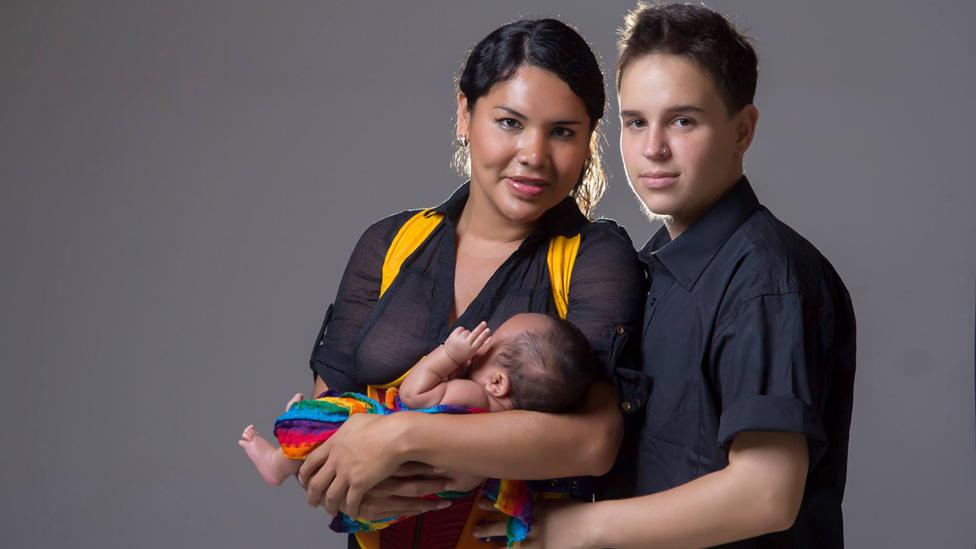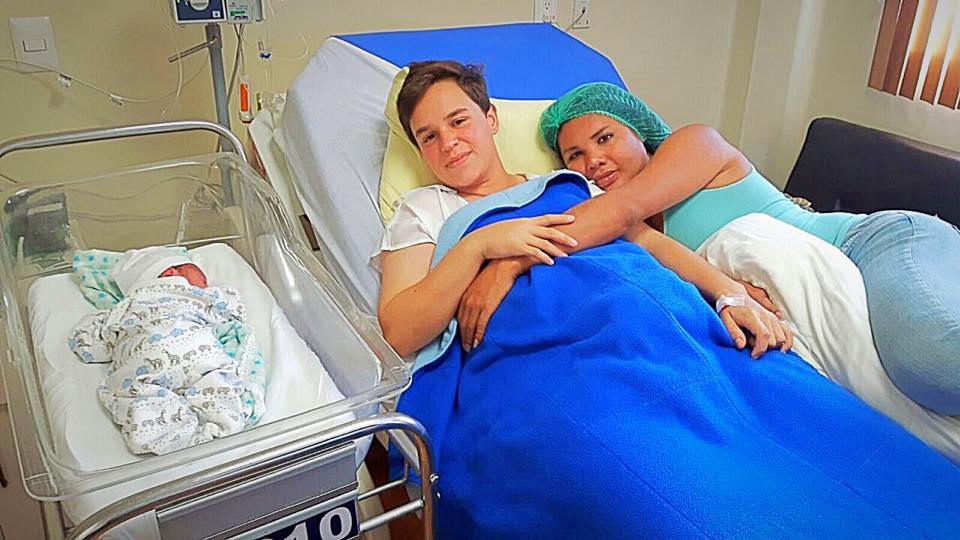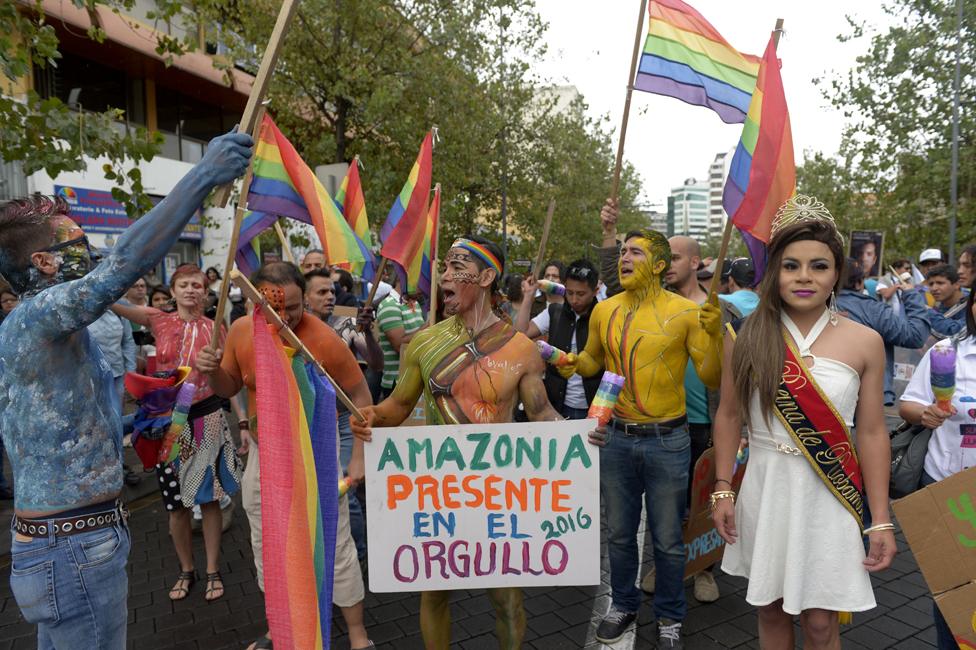The transgender family where the father gave birth
- Published
Meet Diane and Fernando - Ecuador's first transgender family
Meet one of South America's most high-profile transgender families.
"We don't have a name yet - or rather we do - we are just waiting to announce it," Diane tells me, not looking up from tapping at her mobile phone with her perfectly manicured false nails. The choice will be controversial and she and her partner want to wait until everything has calmed down.
It's Pride Week in Guayaquil, Ecuador's largest city. I'm driving Diane Rodriguez, her partner Fernando and their six-week-old baby - known affectionately for now only as Caraote - which means "the snail". Tomorrow is the big march and they are whizzing around town finalising paperwork for their float.
Diane and Fernando are South America's most high-profile transgender couple. For many, they are a symbol of growing tolerance in the region.

The couple met on Facebook after Diane - born as Luis - spent hours scrolling through profiles, looking for the same thing many women desire in a partner: someone to support her career (as an activist), but also to have a family with. She met Fernando, who is also transgender.
In their case, neither Fernando nor Diane has had gender reassignment surgery. That meant they could conceive a baby like any other couple - without any medical intervention.

We sit in the car waiting for Diane to emerge from yet another official's office. Fernando - who was born Maria in Venezuela - tells me of their whirlwind romance as "the snail" sleeps on. "I was on a bus to Ecuador days after we started chatting online," Fernando smiles. "After three weeks living together, I was pregnant," he tells me.
Ecuador is a polarised society to bring a child into as a transgender parent. While there is great social change going on, there is also great opposition to that change - and it can be violently expressed.
Diane herself has been abducted several times. The scruffy downtown offices of her organisation, Silueta X, are monitored by CCTV for safety.

Find out more
From Our Own Correspondent has insight and analysis from BBC journalists, correspondents and writers from around the world
Listen on iPlayer, get the podcast or listen on the BBC World Service or on Radio 4 on Thursdays at 11:00 BST and Saturdays at 11:30 BST

Yet activists like Diane are happy to have a high profile because they feel it helps educate the public. During Fernando's pregnancy, the couple published a startling video clip on Facebook - of a doctor, telling Fernando not to forget he is a woman. The video was shared widely and the hospital apologised.
Being "out" - that is, publicly recognised as trans - is not something Diane has a problem with these days. But it has been a painful journey. There have been spells of prostitution and estrangement from her family, but despite that Diane's current status as a pin-up activist is one she positively cultivates. Posed photos of her, wearing her signature body-shaping corsets alongside Fernando's boy-band good looks, are constantly posted on the multiple social media accounts they run. And they garner thousands of likes.

Transgender pregnancy
Thomas Beatie, from the US state of Arizona, is often referred to as the world's first known pregnant transgender man; he gave birth in 2008 and is now a father of three
Trans men, assigned female at birth, often receive hormone therapy treatment, but recent studies show that this does not prevent pregnancies in the short or long-term
As of July 2016, 23 countries in Europe, external, including France, Switzerland and Finland, require sterilisation in order for a person to be legally recognised as trans
In the UK, the NHS funds sex changes for transgender people and offers them fertility treatment and the ability to freeze their egg and sperm

This brand of activism isn't to everyone's tastes. This year, a picture of the couple under a sheet - released to coincide with the announcement of their impending parenthood - was carried through Quito's Pride March with a big red cross struck through it. It was a criticism from what might seem like the couple's most obvious ally - the LGBT community of Ecuador.
Some people in that community feel that Diane's relationship with President Rafael Correa - a staunch Catholic who has made several transphobic and homophobic comments - is too cosy. They claim she is just cultivating her political ambitions. In 2013, Diane was the first transgender person in Ecuador to stand for election to congress, but didn't make it. Now she has her eye set on running in 2017.

Pride parade in Quito, July 2016: Some of Ecuador's LGBT community are critical of Diane and Fernando
Diane has attracted criticism for trying to bridge the gap between the Catholic establishment and LGBT groups. Some say she can't stay on good terms with both. Yet it's hard deny that her life so far has been all about finding new ways to reconcile opposing identities. She is a trans person who has scorned societal labels by refusing gender reassignment, yet also embraced the family institution to become a mother.
That evening, when I pull up in the car outside the couples' half-finished house in a northern neighbourhood of Guayaquil, it's already dark. I watch from the drive as the uncompromising activist and her partner, who I have spent the last six hours chauffeuring around the city, put their baby to bed. The sound of the child's mobile tinkles in the night. Diane draws the bedroom curtains - one pink, one blue, and turns out the light.
This article was made possible through a grant to the author from the One World Media foundation